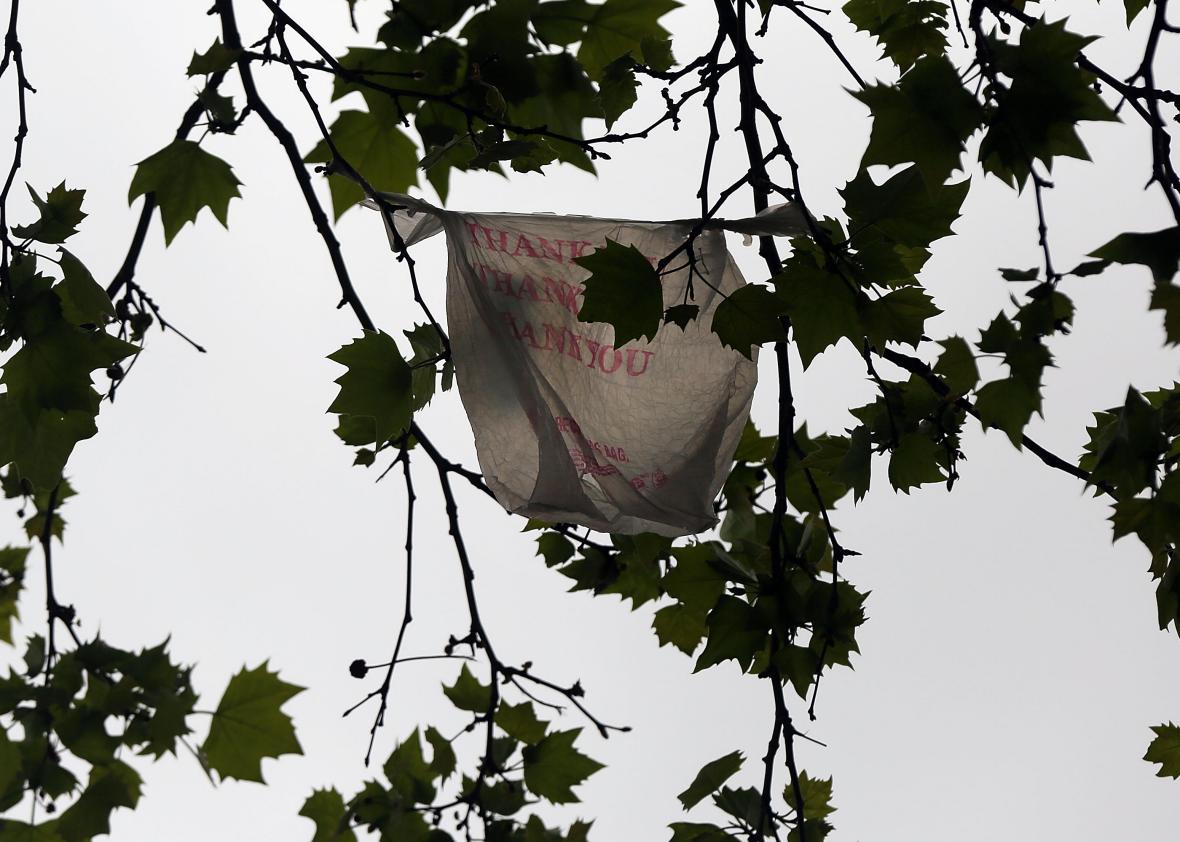On Tuesday, New York Gov. Andrew Cuomo found himself in a familiar predicament: how to reconcile his progressive self-image with a pattern of governing that generates more opposition on the left than on the right.
Confronted with the state Legislature’s pre-emption of a New York City rule to reduce plastic bag use, Cuomo signed away the city’s regulation. In doing so he joined a group of Republican governors—Arizona’s Doug Ducey, Idaho’s Butch Otter, Wisconsin’s Scott Walker, Vice President and former Indiana Gov. Mike Pence, to name a few—who have approved bans on, well, bag bans. It’s a model law incubated by the right-wing American Legislative Exchange Council, and a favored method of the plastics industry, which correctly sees local action against plastic bags as a precursor to wider prohibitions.
Most of those governors are happy to align themselves with the business interests of plastic bag manufacturers. But Cuomo has a reputation to uphold. And so he offered a long statement that, with the acrobatics of a plastic bag darting down a windy Manhattan avenue, argued that the city’s now-gutted law was actually too pro-business.
The city law would have placed a mandatory 5-cent fee on plastic bag sales, to be collected by merchants. (Such fees are common around the country and have been proven to reduce bag use in other cities.) Countermeasures and exceptions would have eased the burden on poor New Yorkers: the sanitation department planned to give out 400,000 reusable bags, customers using food stamps were exempted, and food carts and stands would not have been required to charge a fee.
The most objectionable part of the city’s bill, Cuomo argues, is that merchants keep the 5-cent fee on every plastic bag sold; the city council does not have the power to levy a tax. “A 100 million dollar bonus to private companies is beyond the absurd,” he said in his statement. “Legislation often requires compromise but not capitulation. There is no need to pass an overly compromised bill—we can and should promulgate the best policy in the country.”
The state-specific context here is that Cuomo and Bill de Blasio, the Democratic mayor of New York City, have a long-running feud that extends to matters as trivial as the fate of a deer in a city park. But his windy, defensive statement suggests this was not the governor’s vindictive side on display, but something more timid.
Cuomo announced he would establish a statewide “task force” to develop a plan. But the odds of him pushing a more stringent anti–plastic bag measure through Albany are low. (Legislators’ concerns, sincere or otherwise, were not that the bill was a “capitulation” to business interests. Instead, they displayed the concern trolling for the poor that often cloaks opposition to health and environmental regulation.) Perhaps Cuomo foresees that when his task force’s recommendations are rejected, he will be able to assume his rightful role as environmental warrior martyred by reactionary state legislators.
Cuomo argues that because plastic bags pollute the entire state, a statewide remedy is the only effective course of action. This is dumb and disingenuous. Disingenuous because, if he thought that way, why would he have waited until now to form a task force on plastic bag pollution? (The city’s bag fee was approved nine months ago.) Dumb because plastic bags are so evidently more of a problem in densely populated areas, where littering pedestrians and overflowing public trash cans release bags into trees and waterways. The old GOP bromide about a “uniform regulatory environment” holds no sway here; there is no plausible scenario in which either businesses or consumers would cross city lines to operate in a Disposable Container Freedom Zone.
The truth is that laws discouraging the use of plastic bags start local. Hawaii’s de facto statewide plastic bag ban is actually a patchwork of county prohibitions. California’s would never have been possible had cities like San Francisco not proved its viability. That’s why the American Progressive Bag Alliance, which lobbies on behalf of bag manufacturers, lines up behind bills like the one Gov. Cuomo signed. They know that local case studies, evolving in fits and starts, eventually prove that life without plastic bags is possible. And evidently Cuomo knows it too: His statement cites the need to look at other cities that have tried to get a handle on plastic bags, such as D.C. and Chicago.
If only there were one closer to home.
